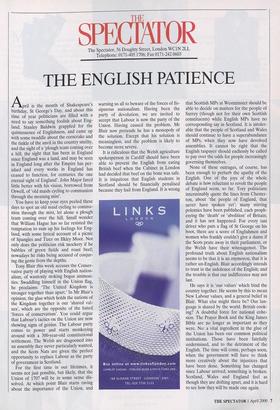The Spectator, 56 Doughty Street, London WC1N 2LL Telephone: 0171-405
1706; Fax 0171-242 0603
THE ENGLISH PATIENCE
You have to keep your eyes peeled these days to spot an old maid cycling to commu- nion through the mist, let alone a plough team coming over the hill. Small wonder that William Hague has so far resisted the temptation to sum up his feelings for Eng- land, with some lyrical account of a picnic of Spangles and Tizer on Ilkley Moor. Not only does the politician risk mockery if he babbles of green fields and roast beef; nowadays he risks being accused of conjur- ing the genie from the depths.
Tony Blair this week accuses the Conser- vative party of playing with English nation- alism, of wantonly stoking bogus animosi- ties. Swaddling himself in the Union flag, he proclaims: 'The United Kingdom is stronger together than apart.' In Mr Blair's opinion, the glue which holds the nations of the Kingdom together is our 'shared val- ues', which are the opposite of the hated `forces of conservatism'. You could argue that Labour's tactics on the Union are now showing signs of genius. The Labour party comes to power and starts monkeying around with a 300-year-old constitutional settlement. The Welsh are dragooned into an assembly they never particularly wanted, and the Scots Nats are given the perfect opportunity to replace Labour as the party of government in Scotland. .
For the first time in our lifetimes, it seems not just possible, but likely, that the Union of 1707 will be in some sense dis- solved. At which point Blair starts raving about the importance of the Union, and warning us all to beware of the forces of fis- siparous nationalism. Having been the party of devolution, we are invited to accept that Labour is now the party of the Union. Having caused the problem, Mr Blair now pretends he has a monopoly of the solution. Except that his solution is meaningless, and the problem is likely to become more severe.
It is ridiculous that the Welsh agriculture spokesperson in Cardiff should have been able to prevent the English from eating British beef when the Cabinet in London had decided that beef on the bone was safe. It is iniquitous that English students in Scotland should be financially penalised because they hail from England. It is wrong that Scottish MPs at Westminster should be able to decide on matters for the people of Surrey (though not for their own Scottish constituents) while English MPs have no corresponding say in Scotland. It is intoler- able that the people of Scotland and Wales should continue to have a superabundance of MPs, when they now have devolved assemblies. It cannot be right that the English taxpayer should endlessly be called to pay over the odds for people increasingly governing themselves.
None of these outrages, of course, has been enough to perturb the apathy of the English. One of the joys of the whole debate is how reluctant to revolt the people of England seem, so far. Tory politicians interminably quote the lines from Chester- ton, about 'the people of England, that never have spoken yet'; many stirring polemics have been published, each proph- esying the 'death' or 'abolition' of Britain; and it has not happened. For every taxi driver who puts a flag of St George on his boot, there are a score of Englishmen and women who frankly couldn't give a damn if the Scots prate away in their parliament, or the Welsh have their witenagemot. The profound truth about English nationalism seems to be that it is an oxymoron, that it is rather un-English. Blair accordingly intends to trust in the indolence of the English; and the trouble is that our indifference may not last.
He says it is 'our values' which bind the country together. He seems by this to mean New Labour values, and a general belief in Blair. What else might there be? Our lan- guage is shared by the world. British cook- ing? A doubtful force for national cohe- sion. The Prayer Book and the King James Bible are' no longer as important as they were. No: a vital ingredient in the glue of the Union has been our common political institutions. Those have been fatefully undermined, and to the detriment of the English. The time will come, perhaps soon, when the government will have to think more creatively about the injustices that have been done. Something has changed since Labour arrived; something is broken. Scotland, Wales and England feel as though they are drifting apart, and it is hard to see how they will be made one again.






















































































 Previous page
Previous page